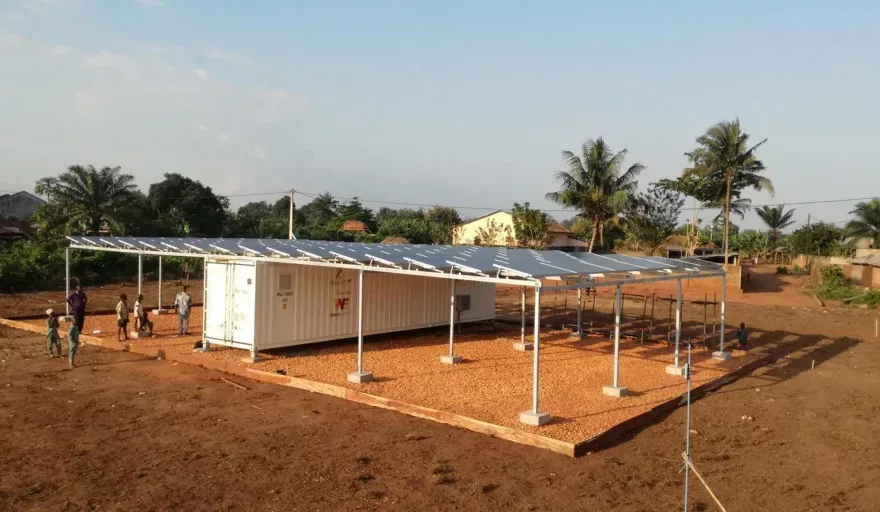With an estimated 770 million people worldwide without electricity, internet or water, Winch Energy seeks to overcome this challenge through designing and producing robust, cost-effective engineering solutions for the off-grid electricity market.
SERVING THE DEVELOPING WORLD
Providing affordable access to clean energy that impacts people and the planet – for Winch Energy, the aim is clear. The company is a global, off-grid energy developer and technology designer and integrator. Winch Energy focuses on renewable energy and energy efficiency projects across Europe, Africa, Latin America and Asia, and through its Remote Power Units (RPUs), the organisation provides a three-utility solution for the estimated 770 million people (2019) globally without electricity, internet, or water.
Today, Winch Energy operates in five countries across Africa, with two key projects under construction in Sierra Leone and Uganda, providing more than 6,600 connections and helping over 150,000 people.
Since the company’s founding in 2008, Nicholas Wrigley, CEO at Winch Energy, has successfully developed, constructed and operated more than 300 megawatts (MW) of solar plants in Europe. He has also managed the African platform and created a 120 MW wind power plant and is now specialising in off-grid using world-leading technology. For Wrigley, he believes that while the industry in Africa is largely an exciting space, he acknowledges that the significant cost of doing business in the continent can’t be underestimated and he imagines it will “potentially put off a lot of new businesses from outside Africa.”
Winch Energy develops off-grid projects and provides its own technology, which is unique for the industry. The organisation also has $100 million off balance sheet funding platform with EDF, Mitsubishi and Meridiam (Neot Africa) which provides debt and equity funding to enable Winch Energy to build and operate its projects.
REMOTE POWER UNITS BY WINCH ENERGY
Winch Energy designs and manufactures bespoke 20 and 400-foot containers for its standard Remote Power Units. Operating its own manufacturing facility means that Winch Energy can meet its customers’ specific needs for any small to medium sized off-grid infrastructure that requires a constant and reliable power supply. All RPUs can include an optional diesel back-up to ensure power supply to critical loads. Wi-Fi connectivity and other services can be added to the RPU, such as office or retail spaces within the container.
Winch Energy has since designed and launched a larger range of the RPU, created to provide an off-grid solution for medium to large sized infrastructure, including small towns and large commercial and industrial use. They can be installed with or without a distribution network and metering. The new models of the RPU range from 500 kilowatts peak (kWp) up to four megawatt peak (MWp) with a variety of sizes in between.
Winch Energy has a clear mission – to provide affordable, clean energy in developing communities across the world. The company seeks to accomplish this through designing and producing robust, cost-effective engineering solutions for the off-grid electricity market. Winch Energy believes that access to clean electricity for every citizen in the world can be achieved in a financially sustainable manner while encouraging private investors to support the realisation of this ambition.
However, with millions of people unaccounted for in remote areas across Africa, Wrigley acknowledges the scope of the challenge he and his company continues to face.
“We have the technology and management systems, but the world has to get organised to provide subsidies for the systems to be installed,” he explains. “At the moment, the subsidy regimes are either insufficient or badly managed. Subsidies are needed for the smaller systems, but above a certain size, no subsidies are required.”
SUSTAINABILITY DRIVE
Winch Energy directly contributes towards the United Nations’ Sustainable Development Goals of providing affordable and clean energy, however, is also actively working towards other Sustainable Development Goals such as no poverty, quality education, gender equality and decent work and economic growth. This can be achieved via supporting socio-economic growth:
- Mini-grids allow the productive use of energy by supporting heavy appliances within small commercial businesses. This can include barber shops, grain hammer/oil seed press mills and electronics sales and repair shops.
Additional services such as Wi-Fi allows access to credit and internet banking, which further aids the creation and growth of local businesses.
- Positive impacts are significant and can include employment opportunities, enhanced agricultural production, as well as poverty reduction.
Stable access to electricity also provides a range of societal benefits:
- An increase in educational and literacy performance levels through access to lighting and access to appliances such as PCs and printers.
- Numerous gender-specific benefits, including the electrification of maternal health clinics, increased access to education and a reduction in gender-based violence in lighting.
It is through these approaches that Winch plays an influential role in stimulating the local economy and providing increased opportunities for all.
Today, Winch currently has over £500 million of export credit support from UKEF on projects which are being developed in Benin, Senegal, Ethiopia, Uganda and Mexico, in addition to currently being in the midst of fundraising for $25 million additional corporate capital which should be completed by the end of 2021.
“These additional resources will enable us to fund the contraction of significant additional towns and villages in the years to come.”
But Winch has no plans to stop there. “Our goals are to successfully build and commission the 63 sites we now have under contract, open an office in Nigeria and secure one large sale of technology funded through export credit loans,” affirms Wrigley.





























